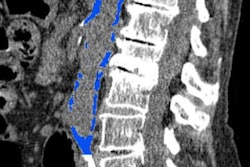
Patients who have insurance coverage for CT colonography (CTC), also known as virtual colonoscopy, are much more likely to receive any form of colorectal cancer screening -- even a different screening test such as colonoscopy, according to research published online July 11 in Radiology.
In a retrospective study involving more than 33,000 patients, a team from the University of Wisconsin found that patients who were due for colorectal cancer screening and had insurance coverage for CTC were nearly 50% more likely to receive colorectal cancer screening by any method than those without coverage.
The results add heft to arguments that the U.S. Centers for Medicare and Medicaid Services (CMS) should add Medicare coverage for CTC screening exams.
"Policymakers should consider additional options for [colorectal cancer] screening when considering strategies to increase overall screening rate," wrote the group led by Maureen Smith, PhD.
Increasing screening rates
Greater use of alternative screening methods has been proposed to improve colorectal cancer screening rates, which still remain suboptimal, according to the researchers. A recent study found that screening rates have plateaued at 65% from 2010 to 2012.
To see if more insurance-covered options would increase colorectal cancer screening, the researchers sought to compare overall screening rates in patients with and without insurance coverage for CTC colorectal cancer screening. They retrospectively reviewed longitudinal electronic health record data for 33,177 patients from 2005 through 2010 at a large multispecialty physician group. All patients were younger than 65 and were eligible and due for colorectal cancer screening.
Over the course of the study, 17,144 (52%) of the patients received colorectal cancer screening, with colonoscopy being the most common screening test performed:
- Colonoscopy: 12,599 screening tests (73%)
- Fecal occult blood testing (FOBT): 2,214 screening tests (13%)
- CTC: 1,945 screening tests (11%)
- Flexible sigmoidoscopy: 375 screening tests (2%)
- Barium enema: 11 screening tests (< 1%)
More likely to receive screening
After adjusting for potential confounding variables, the researchers found that at any given time, individuals who had insurance coverage for CTC were eight times more likely to receive CTC than those who did not have coverage.
What's more, individuals with insurance had a propensity-adjusted hazard ratio of 1.48 to receive any form of colorectal cancer screening, indicating a 48% greater likelihood of receiving colorectal cancer screening compared with those who did not have insurance.
| Effect of insurance coverage on colon cancer screening rates | ||||
| To receive screening with CTC | To receive any form of screening | To receive screening with FOBT | To receive screening with colonoscopy | |
| Propensity-adjusted hazard ratio for patients with insurance | 8.35 | 1.48 | 1.00 | 1.38 |
A hazard ratio of 1.00 indicated no increased likelihood to receive screening with FOBT, while a 1.38 hazard ratio reflected a 38% greater likelihood of receiving colonoscopy as a screening test.
"Although higher rates of [colorectal cancer] screening with CT colonography were expected for those with insurance coverage for CT colonography, our results are also consistent with evidence that patients who are offered a choice of [colorectal cancer] screening tests are more likely to complete screening than patients offered either type of test alone," the authors wrote.
Low usage rate
Even with insurance coverage for CTC, the screening test accounted for only 11% of the colorectal cancer screening studies performed over the six-year study. The authors noted, however, that CTC is a relatively new screening test and hadn't yet been recommended by the U.S. Preventive Services Task Force (USPSTF) as an acceptable option for colorectal cancer screening.
"As such, substantial variation in adoption of CT colonography existed at our institution," the authors wrote. "Uptake in other centers throughout the United States is currently much lower."
The recent inclusion of CTC in the USPSTF guidelines, coverage by additional insurers such as CMS for Medicare beneficiaries, and broader acceptance by primary care physicians may also increase the use of CTC screening, according to the researchers.
"Primarily, due to lack of coverage for Medicare beneficiaries, utilization at the study center has not yet increased since 2010," the authors wrote.
Time for Medicare coverage
In a statement, the American College of Radiology (ACR) said the findings support the USPSTF's recommendations that more tests -- including virtual colonoscopy -- be used to boost colorectal cancer screening and save lives. As a result, Medicare should cover virtual colonoscopy for seniors, said Dr. Judy Yee, chair of the ACR Colon Cancer Committee.





















